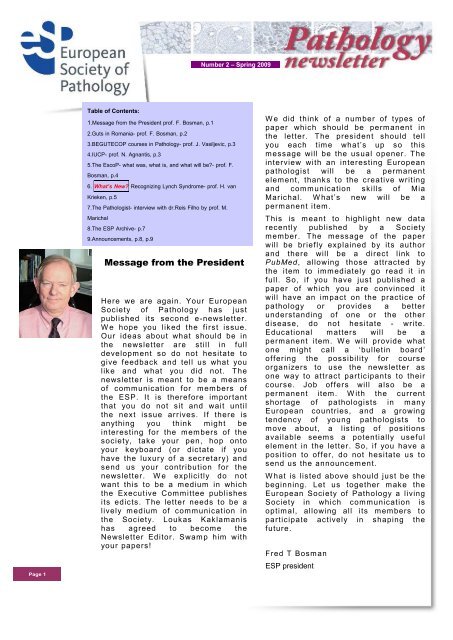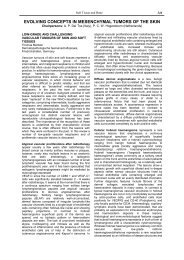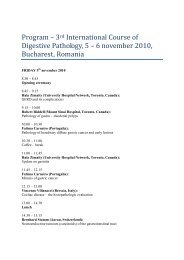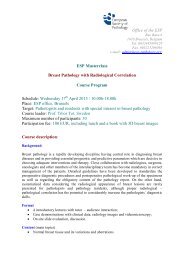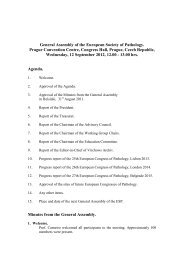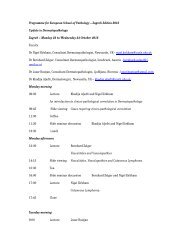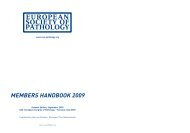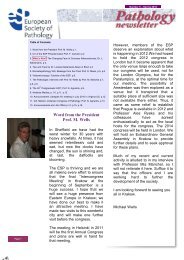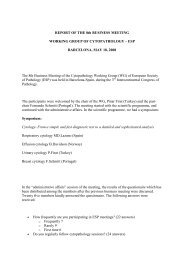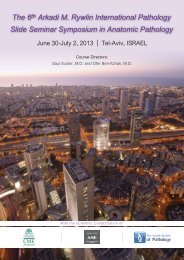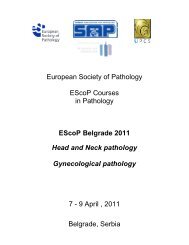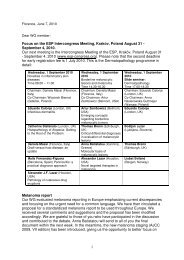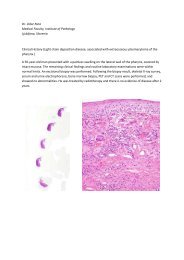Number 2 – Spring 2009 - European Society of Pathology
Number 2 – Spring 2009 - European Society of Pathology
Number 2 – Spring 2009 - European Society of Pathology
Create successful ePaper yourself
Turn your PDF publications into a flip-book with our unique Google optimized e-Paper software.
Page 1<br />
<strong>Number</strong> 2 <strong>–</strong> <strong>Spring</strong> <strong>2009</strong><br />
Table <strong>of</strong> Contents:<br />
1.Message from the President pr<strong>of</strong>. F. Bosman, p.1<br />
2.Guts in Romania- pr<strong>of</strong>. F. Bosman, p.2<br />
3.BEGUTECOP courses in <strong>Pathology</strong>- pr<strong>of</strong>. J. Vasiljevic, p.3<br />
4.IUCP- pr<strong>of</strong>. N. Agnantis, p.3<br />
5.The EscoP- what was, what is, and what will be?- pr<strong>of</strong>. F.<br />
Bosman, p.4<br />
6. What’s New? Recognizing Lynch Syndrome- pr<strong>of</strong>. H. van<br />
Krieken, p.5<br />
7.The Pathologist- interview with dr.Reis Filho by pr<strong>of</strong>. M.<br />
Marichal<br />
8.The ESP Archive- p.7<br />
9.Announcements, p.8, p.9<br />
Message from the President<br />
Here we are again. Your <strong>European</strong><br />
<strong>Society</strong> <strong>of</strong> <strong>Pathology</strong> has just<br />
published its second e-newsletter.<br />
W e hope you liked the first issue.<br />
Our ideas about what should be in<br />
the newsletter are still in full<br />
development so do not hesitate to<br />
give feedback and tell us what you<br />
like and what you did not. The<br />
newsletter is meant to be a means<br />
<strong>of</strong> communication for members <strong>of</strong><br />
the ESP. It is therefore important<br />
that you do not sit and wait until<br />
the next issue arrives. If there is<br />
anything you think might be<br />
interesting for the members <strong>of</strong> the<br />
society, take your pen, hop onto<br />
your keyboard (or dictate if you<br />
have the luxury <strong>of</strong> a secretary) and<br />
send us your contribution for the<br />
newsletter. W e explicitly do not<br />
want this to be a medium in which<br />
the Executive Committee publishes<br />
its edicts. The letter needs to be a<br />
lively medium <strong>of</strong> communication in<br />
the <strong>Society</strong>. Loukas Kaklamanis<br />
has agreed to become the<br />
Newsletter Editor. Swamp him with<br />
your papers!<br />
W e did think <strong>of</strong> a number <strong>of</strong> types <strong>of</strong><br />
paper which should be permanent in<br />
the letter. The president should tell<br />
you each time what’s up so this<br />
message will be the usual opener. The<br />
interview with an interesting <strong>European</strong><br />
pathologist will be a permanent<br />
element, thanks to the creative writing<br />
and communication skills <strong>of</strong> Mia<br />
Marichal. W hat’s new will be a<br />
permanent item.<br />
This is meant to highlight new data<br />
recently published by a <strong>Society</strong><br />
member. The message <strong>of</strong> the paper<br />
will be briefly explained by its author<br />
and there will be a direct link to<br />
PubMed, allowing those attracted by<br />
the item to immediately go read it in<br />
full. So, if you have just published a<br />
paper <strong>of</strong> which you are convinced it<br />
will have an impact on the practice <strong>of</strong><br />
pathology or provides a better<br />
understanding <strong>of</strong> one or the other<br />
disease, do not hesitate - write.<br />
Educational matters will be a<br />
permanent item. W e will provide what<br />
one might call a ‘bulletin board’<br />
<strong>of</strong>fering the possibility for course<br />
organizers to use the newsletter as<br />
one way to attract participants to their<br />
course. Job <strong>of</strong>fers will also be a<br />
permanent item. W ith the current<br />
shortage <strong>of</strong> pathologists in many<br />
<strong>European</strong> countries, and a growing<br />
tendency <strong>of</strong> young pathologists to<br />
move about, a listing <strong>of</strong> positions<br />
available seems a potentially useful<br />
element in the letter. So, if you have a<br />
position to <strong>of</strong>fer, do not hesitate us to<br />
send us the announcement.<br />
W hat is listed above should just be the<br />
beginning. Let us together make the<br />
<strong>European</strong> <strong>Society</strong> <strong>of</strong> <strong>Pathology</strong> a living<br />
<strong>Society</strong> in which communication is<br />
optimal, allowing all its members to<br />
participate actively in shaping the<br />
future.<br />
Fred T Bosman<br />
ESP president
Page 2<br />
Guts in Romania<br />
The EScoP course in Craiova (18-21 st <strong>of</strong> Sept. 2008)<br />
EscoP organized a 4 day course on Gastrointestinal pathology<br />
in Craiova, with as local organizer Emil Plesea.<br />
A 4 day course was decided upon, with for each day one<br />
dedicated faculty member. Topics covered were GERD and<br />
Barrett’s esophagus; chronic gastritis; an update in gastric<br />
cancer; biopsy pathology <strong>of</strong> the small intestines; an update in<br />
inflammatory bowel disease; colorectal adenomas and<br />
carcinomas and neuroendocrine tumours <strong>of</strong> the GI tract. The<br />
group that enthusiastically agreed to do this consisted <strong>of</strong><br />
Fatima Carneiro <strong>of</strong> Porto, Arzu Ensari (the president <strong>of</strong> the GI<br />
pathology working group) <strong>of</strong> Ankara, Karel Geboes <strong>of</strong> Louvain<br />
and myself.<br />
The course was held in a brand-new auditorium in the central<br />
building <strong>of</strong> the University. For each student a microscope was<br />
available and there was even a videomicroscope, although that<br />
set-up was little used. The faculty had selected about 10 cases<br />
for each (half day) topic, allowing the students to work on real<br />
cases. The format <strong>of</strong> the course was standard for all the topics:<br />
an introductory lecture by the responsible faculty member, time<br />
for working at the microscope and for informal exchange and at<br />
the end <strong>of</strong> the session a ‘wrap up’, somewhat like a slide<br />
seminar but very interactive.<br />
<strong>Number</strong> 2 <strong>–</strong> <strong>Spring</strong> <strong>2009</strong><br />
.<br />
In addition, each faculty member presented a special<br />
lecture with a focus on mechanisms <strong>of</strong> disease or new<br />
approaches in diagnosis. Overall we had about 70<br />
students, mostly from Romania but also some from<br />
Greece, Serbia and Turkey, which was a bit more than<br />
we expected and which caused some difficulties in view<br />
<strong>of</strong> the number <strong>of</strong> microscopes and slide sets available.<br />
Also, with a smaller group <strong>of</strong> students the exchange with<br />
the faculty would have been easier but with a very<br />
agreeable and open group <strong>of</strong> course participants, the<br />
interaction was lively and intense anyhow.<br />
Obviously the course was evaluated by the students.<br />
Overall the content and the format was highly<br />
appreciated. The evaluation made clear that the student<br />
group was quite heterogeneous. Some insisted on more<br />
introductory very basic information. Others wanted a<br />
more advanced level. We have to conclude that better<br />
targeting the participants in the course, through more<br />
explicitly announcing the targeted audience or selection<br />
criteria for participation, might solve this problem. What<br />
also transpired was less affinity with more scientific<br />
aspects <strong>of</strong> pathology, the ‘science behind the diagnosis’.<br />
The faculty has reflected on the comments <strong>of</strong> the<br />
students and will adapt the program to the constructive<br />
criticisms received. Important will be to get student<br />
groups with a more or less equal level <strong>of</strong> advancement in<br />
pathology. The faculty also insists on the scientific<br />
elements in the program. <strong>Pathology</strong> is in rapid evolution<br />
and part <strong>of</strong> the preparation for a lifelong career in<br />
pathology must be solid understanding <strong>of</strong> the scientific<br />
aspects <strong>of</strong> our discipline.<br />
The course was not only work, not for the faculty nor for<br />
the students. The faculty was taken for one night to the<br />
former hunting lodge <strong>of</strong> Nicolae Ceaucescu. That was<br />
quite an experience: driving through Rumanian<br />
countryside, learning not to worry about the traffic, a<br />
quiet night in a very pretty lodge in spectacular<br />
surroundings with good food and good wine and for Arzu,<br />
a close encounter with bugs! Also the students had<br />
sufficient time to have informal exchange over lunch and<br />
breaks and then there was the spectacular evening party<br />
during which the participants received their diploma’s.<br />
Overall, also socially the course was a great success.<br />
New friendships were made, old ones confirmed and<br />
hopefully these new contacts will contribute to a rich<br />
pr<strong>of</strong>essional life for the participating residents and young<br />
pathologists.<br />
A very positive experience, without any doubt. We as<br />
course faculty would like to thank Emil Plesea (and the<br />
members <strong>of</strong> his crew, notably Dan Enache) for<br />
organizing this, for all the students that so<br />
enthusiastically participated and provided quality feedback<br />
and the ESP for financial support. We know we<br />
need more <strong>of</strong> them: EScoP courses with this essential<br />
blend <strong>of</strong> practice orientation, basic knowledge, dedicated<br />
faculty and open exchange between generations.<br />
Pr<strong>of</strong>. Fred Bosman<br />
Course coordinator
Dear colleagues and members <strong>of</strong> the ESP,<br />
In the first edition <strong>of</strong> the Newsletter you were able to learn all<br />
about the Ioannina University Courses in <strong>Pathology</strong>. The real truth<br />
goes far beyond that. When in 1996 Pr<strong>of</strong>. Agnantis, and her<br />
collaborators, started the IUCP Courses, a new phase started in<br />
the field <strong>of</strong> pathology education in Europe. I was very privileged to<br />
participate in many <strong>of</strong> these wonderful Courses, and to experience<br />
Niki’s, and Greek hospitality and their pr<strong>of</strong>essional approach to<br />
course organization.<br />
So, this year we founded the Serbian Division <strong>of</strong> the IAP, and set<br />
as our goal : to promote <strong>Pathology</strong> Courses locally. It was easy to<br />
copy something good and established. We are grateful to<br />
Ioannina Courses in <strong>Pathology</strong> and are looking forward to our first<br />
‘Belgrade University Teaching Course in <strong>Pathology</strong>’<br />
(BEGUTECOP).<br />
Our first Course will be about Prostate Cancer <strong>–</strong> <strong>Pathology</strong> and<br />
Clinical aspects. We are sure that the idea <strong>of</strong> making these<br />
educational Clinico-pathological Courses in Belgrade is <strong>of</strong> great<br />
importance mainly to our residents, young pathologists and young<br />
clinicians, who are rarely present at foreign congresses or<br />
courses. We are expecting participants from neighbouring<br />
countries, and those who are willing to improve their knowledge<br />
in modern clinical pathology. We hope that these Courses will<br />
represent a change towards better pathology in our country and<br />
the region, especially in today’s very peculiar political and<br />
economic situation.<br />
The participation <strong>of</strong> future distinguished tutors, from abroad and<br />
Serbia, their experience and knowledge, and our determination to<br />
improve the level <strong>of</strong> pathology in Serbia, I think, will allow us to<br />
organise more <strong>of</strong> these Courses.<br />
Therefore, I would like to express my sincere gratitude to all my<br />
friends for their help and contribution to this project. We will<br />
address the Executive Committee <strong>of</strong> the ESP with a request to put<br />
the organization <strong>of</strong> the BEGUTECOP under the auspices <strong>of</strong> the<br />
ESP.<br />
For the successful organization <strong>of</strong> all our future Courses, the<br />
active involvement <strong>of</strong> a Belgrade Medical School will be<br />
incorporated, with Continuing Medical Education (CME) credits,<br />
the help <strong>of</strong> the Ministry <strong>of</strong> Science <strong>of</strong> Serbia, and pharmaceutical<br />
companies. Our Medical School will provide the facilities for the<br />
realization <strong>of</strong> these Courses.<br />
Finally, I hope that with carefully planned topics for BEGUTECOP<br />
Courses in the future, you will come and participate, as tutors or<br />
students, having an enjoyable stay in Belgrade, designated by<br />
many as one <strong>of</strong> ‘the most lively cities in Europe’.<br />
I can guarantee that ...<br />
Page 3<br />
Pr<strong>of</strong>. Jovan Vasiljevic<br />
<strong>Number</strong> 2 <strong>–</strong> <strong>Spring</strong> <strong>2009</strong><br />
Ioannina University Courses in <strong>Pathology</strong><br />
A Historical Overview<br />
Postgraduate courses on selected topics <strong>of</strong> Human<br />
<strong>Pathology</strong> are organized every year, mainly, on a<br />
residential basis.<br />
The aim <strong>of</strong> the courses is to bring together young<br />
Pathologists and Tutors, experts in the various fields <strong>of</strong><br />
<strong>Pathology</strong>, as well as to encourage active participation <strong>of</strong> all<br />
colleagues during the discussions following the Lectures<br />
and the Slide Seminars, providing an in-depth review <strong>of</strong><br />
Diagnostic Surgical <strong>Pathology</strong>. An emphasis is given on<br />
morphologic features, newly recognized entities and<br />
modern techniques. A limited number <strong>of</strong> didactic Lectures<br />
given by established and distinguished investigators cover<br />
each topic theoretically. The Courses have been designed<br />
for 45-50 Pathologists and Clinical Colleagues related to<br />
the subject. The duration <strong>of</strong> each Course is two days.<br />
Up to now 26 Courses have been organized, since 1996.<br />
This tremendous experience has led us to a continuous<br />
improving, always according to our students’ feed back.<br />
This year the Scientific Program is enriched with many<br />
Slide Seminars, which will be <strong>of</strong>fered in the form <strong>of</strong><br />
interactive case presentations. Furthermore, the Clinicians<br />
will incorporate their talks in multidisciplinary Sessions.<br />
Diplomas are given for regular attendance only.<br />
Knowledge <strong>of</strong> ENGLISH is required.<br />
Pr<strong>of</strong>. Niki Agnantis
Page 4<br />
<strong>Number</strong> 2 <strong>–</strong> <strong>Spring</strong> <strong>2009</strong><br />
The <strong>European</strong> School <strong>of</strong> <strong>Pathology</strong>: what was, what is and what will be.<br />
Postgraduate and continuous education has been for decades now one <strong>of</strong> the essential activities <strong>of</strong> the <strong>European</strong><br />
<strong>Society</strong> <strong>of</strong> <strong>Pathology</strong>. In the early years <strong>of</strong> the ESP the main emphasis was on Continuous Education, which<br />
characterizes in part the programme <strong>of</strong> the <strong>European</strong> Congresses <strong>of</strong> <strong>Pathology</strong> with its short and long courses and slide<br />
seminars. In the early 1990'ies a need was felt for training in basic pathology (mechanisms <strong>of</strong> disease). Jean-Alexis<br />
Grimaud seized the opportunity to create EuroCellPath, a series <strong>of</strong> annual courses where young scientist working in a<br />
pathology environment, residents in pathology and experiences experimental and diagnostic pathologists met around<br />
important themes in general pathology.<br />
In parallel, Gianni Busolatti developed the <strong>European</strong> School <strong>of</strong> <strong>Pathology</strong>, based in Torino. The main characteristics <strong>of</strong><br />
the EscoP courses has been 'hands on' (or rather 'eyes on'), practice oriented with a small faculty, groups <strong>of</strong> not more<br />
than about 40 students and intense interaction between faculty and trainees. EScoP grew into a key player in pathology<br />
postgraduate education in Europe and in recent years expanded into other countries, with 'branches' in Turkey and<br />
Romania among others. EScoP received international acclaim when it was awarded the IAP gold medal in 2006.<br />
Over time it became clear that the approach <strong>of</strong> 'mechanisms <strong>of</strong> disease' for the happy few was not the ideal format. In<br />
recent years, with the explosion <strong>of</strong> molecular medicine and its implications in terms <strong>of</strong> molecular pathology, there is also<br />
a growing awareness <strong>of</strong> the need to include aspects <strong>of</strong> mechanisms and new technology into the practice oriented<br />
EScoP courses. Against this background, the executive committee decided to rethink educational policy <strong>of</strong> the ESP. Two<br />
important decisions were taken. First <strong>of</strong> all an Education Committee was to be created to more explicitly develop the<br />
education policy <strong>of</strong> the ESP. The second decision was to maintain the EscoP approach and the name, as both have<br />
become highly appreciated and the name EscoP allows also to recognize the important role Gianni Busolatti had in<br />
getting this important ESP activity <strong>of</strong>f the ground.<br />
What has this reflection led to?<br />
First <strong>of</strong> all, the following mission statement was agreed upon.<br />
Mission statement<br />
The <strong>European</strong> <strong>Society</strong> <strong>of</strong> <strong>Pathology</strong> (ESP) intends to play a leading role in postgraduate and continuous<br />
education in pathology in Europe. The ESP intends to do this through :<br />
• Annual <strong>European</strong> Congresses <strong>of</strong> <strong>Pathology</strong> with a strong accent on didactic content (short courses,<br />
slide seminars)<br />
• EScoP courses in a small group interactive format - practice oriented but anticipating routine use <strong>of</strong><br />
new technology in a diagnostic setting, which implies updates on molecular and cell pathology<br />
• Accrediting and advertising courses organised by national societies<br />
• Interfacing with CME granting bodies <strong>of</strong> the <strong>European</strong> national certification boards and UEMS.<br />
The responsibility <strong>of</strong> ESP educational activities will be confined to an Education Committee, in which the ESP president, the executive<br />
committee members responsible for the education portfolio and members elected by the executive committee will siege.<br />
The Education committee is composed as follows:<br />
Fred Bosman (Chairman)<br />
Nina Gale (Exec.com.)<br />
Bodil Pedersen (Exec.com.)<br />
Josep Lloretta Trull<br />
Helmut Popper<br />
Generoso Bevilacqua<br />
Gianni Bussolatti (adviser)<br />
Fred T Bosman : Chair, ESP Education Committee
Page 5<br />
What’s New?<br />
<strong>Number</strong> 2 <strong>–</strong> <strong>Spring</strong> <strong>2009</strong><br />
Recognizing Lynch Syndrome<br />
Lynch syndrome, previously called<br />
Hereditary Non-Polyposis Colorectal Cancer,<br />
is the most common type <strong>of</strong> hereditary<br />
colorectal cancer and is caused by a<br />
germline mutation in one <strong>of</strong> the DNA<br />
mismatch repair genes, MLH1, MSH2, MSH6<br />
or PMS2. Although Lynch syndrome only<br />
accounts for up to 5% <strong>of</strong> colorectal cancers,<br />
it is relevant to identify Lynch syndrome,<br />
because surveillance substantially reduces<br />
morbidity and mortality in patients and their<br />
family members who are carrier <strong>of</strong> a<br />
mismatch repair gene mutation.<br />
The identification <strong>of</strong> Lynch syndrome starts<br />
with the recognition <strong>of</strong> patients at risk for<br />
Lynch syndrome by clinicians followed by<br />
referral to genetic counselling at a cancer<br />
genetics clinic. Traditionally, clinicians use<br />
the occurrence <strong>of</strong> colorectal cancer and other<br />
Lynch syndrome associated tumours<br />
(carcinoma <strong>of</strong> the endometrium, gall bladder,<br />
stomach, upper urothelial tract most<br />
commonly) in the family to select patients for<br />
such referral. However by using the familial<br />
occurrence <strong>of</strong> cancer only a small proportion<br />
<strong>of</strong> the expected number <strong>of</strong> patients at risk for<br />
Lynch syndrome is identified. This is due to<br />
small families, unawareness by the patients<br />
<strong>of</strong> their own family history and ignorance <strong>of</strong><br />
taking family history <strong>of</strong> cancer by clinicians.<br />
Colorectal tumours that are due to Lynch<br />
syndrome show microsatellite instability<br />
(MSI). MSI is a hallmark <strong>of</strong> a defective<br />
mismatch repair system, which results in<br />
differences in length <strong>of</strong> stretches <strong>of</strong> simple<br />
repeat sequences, called microsatellites,<br />
between normal and tumour DNA. Although<br />
MSI may also occur in sporadic tumours,<br />
diagnosed at relatively high age, in the group<br />
<strong>of</strong> patients suspected for Lynch syndrome<br />
the MSI is predominantly due to genetic<br />
susceptibility. MSI testing on tumours has<br />
been proposed to enhance the recognition <strong>of</strong><br />
patients at risk for Lynch syndrome.<br />
In the so-called MSI-indicated-by-a-Pathologist<br />
(MIPA)-method, the novel practice role for<br />
pathologists is to initiate MSI testing in a<br />
selection <strong>of</strong> patients who are recently<br />
diagnosed and comply with one <strong>of</strong> the<br />
individual Bethesda criteria: colorectal cancer<br />
in a patient younger than 50 years <strong>of</strong> age, two<br />
synchronous or metachronous colorectal<br />
cancers in a patient younger than 70 years,<br />
colorectal cancer and a tumour associated with<br />
Lynch syndrome and endometrium carcinoma<br />
in a patient younger than 50 years. MSI-testing<br />
is a molecular test that requires expertise and<br />
is not available in most laboratories <strong>of</strong><br />
pathology. Immunohistochemistry is a reliable<br />
alternative for MSI testing in colorectal cancer<br />
specimens to identify patients at risk <strong>of</strong> Lynch<br />
syndrome as well as patients with sporadic<br />
microsatellite instable colorectal cancer, if<br />
restricted to a specialized setting. Expertise<br />
with the technique, the availability <strong>of</strong> feedback<br />
from a molecular laboratory and good<br />
interaction with the molecular biologist are<br />
important issues in this respect. Moreover, an<br />
uncertain or aberrant staining result has to be<br />
followed by molecular microsatellite analysis to<br />
confirm the presence <strong>of</strong> a defective DNA<br />
mismatch repair system.<br />
With a tailored implementation strategy <strong>of</strong> the<br />
MIPA-method directed to pathologists and<br />
surgeons 78% <strong>of</strong> patients were recognised to<br />
be at risk for Lynch syndrome compared with<br />
59% with dissemination <strong>of</strong> a written procedure<br />
only. Especially an electronic reminder system<br />
for pathologists was strongly associated with<br />
application <strong>of</strong> MSI testing.<br />
In conclusion, using MRD testing on cancer<br />
tissue results in improved recognition <strong>of</strong> Lynch<br />
syndrome patients which is beneficial for these<br />
patients and their families. It is <strong>of</strong> crucial<br />
importance that such patients are treated by a<br />
multidisciplinary team <strong>of</strong> surgeons, gastroenterologists,<br />
pathologists, molecular biologists<br />
and clinical geneticists.<br />
Pr<strong>of</strong>. Han van Krieken, the ESP Treasurer<br />
PubMed link to the article:<br />
http://www.ncbi.nlm.nih.gov/pubmed/18314603?log$<br />
=activity<br />
Overbeek LI, et al. Interpretation <strong>of</strong> immunohistochemistry for mismatch repair<br />
proteins is only reliable in a specialized setting. Am J Surg Pathol.<br />
2008;32:1246-51.<br />
Kievit W, et al. Cost effectiveness <strong>of</strong> a new strategy to identify HNPCC<br />
patients. Gut. 2005;54:97-102.
The Pathologist<br />
Interview with Dr. Jorge Reis Filho<br />
In this column, we interview “special” ESP members. Pathologists, young or<br />
old, who have something interesting to say, at least in the mind <strong>of</strong> the<br />
interviewer.....<br />
For this edition, we interviewed a young and very successful pathologist, Dr<br />
Jorge Reis Filho.<br />
Jorge Reis Filho was born in Brazil. His childhood was spent in the<br />
countryside <strong>of</strong> Southern Brazil. He went to university at the Universidade<br />
Federal do Parana in Curitiba to study medicine and joined the anatomical<br />
pathology department as an intern in 1994. In 1997 he spent one <strong>of</strong> his<br />
clinical rotations at the Institute <strong>of</strong> Molecular <strong>Pathology</strong> and Immunology<br />
(IPATIMUP) in Oporto, Portugal, and returned there 4 years later to work as<br />
a clinical fellow with Pr<strong>of</strong> Fernando Schmitt. A grant from the Fundacao para<br />
a Ciencia e Tecnologia de Portugal made it possible to move to The<br />
Breakthrough Breast Cancer Research Centre, Institute <strong>of</strong> Cancer Research,<br />
London, where he obtained his PhD, under the supervision <strong>of</strong> Pr<strong>of</strong> Sunil<br />
Lakhani and Pr<strong>of</strong> Alan Ashworth. He became the team Leader <strong>of</strong> the<br />
Molecular <strong>Pathology</strong> Laboratory at the same institute in 2006.<br />
Jorge Reis Filho is the youngest ever member <strong>of</strong> The Royal College <strong>of</strong><br />
Pathologists based on publications, and is currently Associate Editor <strong>of</strong> The<br />
Journal <strong>of</strong> Clinical <strong>Pathology</strong>, member <strong>of</strong> the Editorial Board <strong>of</strong> The Journal<br />
<strong>of</strong> <strong>Pathology</strong>, <strong>of</strong> Laboratory Investigation and <strong>of</strong> the The International Journal<br />
<strong>of</strong> Surgical <strong>Pathology</strong>. Dr Reis Filho has already published > 180 peer<br />
reviewed papers. His main interests are in the development <strong>of</strong> a taxonomy<br />
that better reflects the biological and clinical significance <strong>of</strong> cancers and to<br />
identify novel therapeutic targets for subgroups <strong>of</strong> breast cancer.<br />
MM: Why did you choose to become a pathologist, Jorge?<br />
JRF: Being able to understand the mechanisms <strong>of</strong> disease and to identify<br />
different types <strong>of</strong> cancers already captured my imagination as a student.<br />
During my internship in anatomical pathology, I realised that pathology was<br />
at the interface between science and clinical medicine and that a molecular<br />
revolution was about to happen.<br />
In the early-mid 90s, major technological advances were taking place, genes<br />
causing hereditary diseases were being cloned and ‘cancer genes’ identified.<br />
The concept <strong>of</strong> classifying diseases based on their histopathological and<br />
molecular features and to use this information to infer prognosis, and<br />
response to therapy was incredibly appealing to me. The final decision came<br />
after spending time at IPATIMUP, in Portugal. When I saw how Pr<strong>of</strong><br />
Sobrinho Simoes and Pr<strong>of</strong> Schmitt used molecular methods to solve<br />
diagnostic quandaries in thyroid and breast cancer, I realised that this was<br />
exactly what I wanted to pursue further.<br />
MM: You never considered other career choices?<br />
JRF: I considered chemical engineering as an alternative career; however, I<br />
soon realized that the latter was not what I was after. During medical school,<br />
I did think <strong>of</strong> oncology as an alternative route. Oncology would have given<br />
Page 6<br />
me an excellent opportunity to have contact with patients, but I would have<br />
missed diagnostics and taxonomy too much.<br />
MM: It is clear that you like your job very much, but what do you like the most<br />
about pathology?<br />
JRF: Undoubtedly, the scope <strong>of</strong> our specialty. We do not only guide the<br />
surgeons’ hands but also the oncologists’ decision-making.<br />
Page 6<br />
<strong>Number</strong> 2 <strong>–</strong> <strong>Spring</strong> <strong>2009</strong><br />
Furthermore, we are at the interface between fundamental research and<br />
clinical practice. On a more practical level, the reward we derive from<br />
making the most accurate diagnosis is challenging, intellectually<br />
engaging and, most importantly, benefits the patients directly.<br />
MM: Can you still make time for other things, besides pathology?<br />
JRF: I really enjoy my work and, as it may have already become<br />
apparent, I have great fun doing academic pathology. However, believe<br />
it or not, I have a few hobbies. I am into cinema, in particular the now<br />
old-school nouvelle vague French cinema and avant-garde <strong>European</strong><br />
movies, going to ‘alternative’ rock and jazz gigs, and travelling.<br />
MM: You have spent a substantial part <strong>of</strong> your life away from the<br />
country you grew up in. How are you different from the person who left<br />
Brazil for the first time?<br />
JRF: Moving to and living in different countries have undoubtedly<br />
changed the way I perceive the world around me and, inevitably,<br />
myself. It has been a rewarding pr<strong>of</strong>essional experience, given that you<br />
learn different modus operandi, different ways <strong>of</strong> going about the same<br />
issues and you end up having the chance <strong>of</strong> choosing what you feel<br />
most appropriate for a particular situation. In brief, living in different<br />
countries does broaden one’s horizons. From a personal perspective,<br />
when you move to a different country, you not only have the challenge<br />
<strong>of</strong> starting from scratch, but also you need to get used to other customs,<br />
habits, social code and etiquette. It is sometimes not as easy as one<br />
would hope and one quickly learns to appreciate little things that in the<br />
past were taken for granted. Of course, I miss my mates back in<br />
Portugal, however the way I was received in England was simply<br />
brilliant.<br />
MM: How do you ideally see your own future and, since I am sure you<br />
can influence it, the future <strong>of</strong> pathology?<br />
JRF: Contrary to the widely held belief that there is no future for<br />
pathology and pathologists, as some <strong>of</strong> our ‘mates’ in the clinic would<br />
argue, I would say that if we have the correct attitude, pathology will<br />
thrive in the next few years. Inevitably, the molecular revolution and the<br />
transition from cancer therapy to individualised cancer treatment will<br />
require that our specialty changes and evolves. If we embrace the new<br />
technologies and incorporate them in our armamentarium, the future will<br />
be bright for us. I have to admit that sometimes it is a bit surprising that<br />
some <strong>of</strong> our colleagues perceive the molecular advances as a threat<br />
rather than an opportunity!<br />
As for my future, I want to pursue a career in academic pathology. I am<br />
keen to invest more time in investigating the phenotypic-genotypic<br />
associations in cancer, how morphological phenotypes correlate with<br />
molecular aberrations and how we can identify therapeutic targets for<br />
cancers, in particular breast cancer. With the development <strong>of</strong> next<br />
generation sequencing and its derivatives, the possibility <strong>of</strong> having an<br />
incredibly accurate and genome-wide assessment <strong>of</strong> gene mutations<br />
and copy number aberrations, gene expression and epigenetic changes<br />
in a few weeks is not only science fiction anymore. Coupling these with<br />
functional genomics (RNA interference) and histopathology will give us<br />
a unique opportunity to define at least some <strong>of</strong> the biological drivers <strong>of</strong><br />
cancer, to come up with classification systems that are more clinically<br />
and biologically relevant, and to devise approaches to improve the<br />
management <strong>of</strong> cancer patients.<br />
MM: What advice would you give young pathologists at the start <strong>of</strong> their<br />
career?<br />
JRF: Here goes my piece <strong>of</strong> free advice... To succeed in a career in<br />
academic pathology, one needs to be driven, motivated and to have<br />
clear goals, but at the same time to have a good deal <strong>of</strong> selflessness<br />
and to be able to work for the greater good, given that collaborations<br />
are <strong>of</strong> paramount importance for being successful in academic<br />
pathology. However, one has got to learn how to choose their<br />
collaborators wisely. Life in academic pathology is full <strong>of</strong> pitfalls and<br />
having a good mentor is <strong>of</strong> paramount importance, as they can help us<br />
avoid make ‘those’ silly mistakes! Importantly, to remember that each<br />
one <strong>of</strong> us is different and that the idea <strong>of</strong> one-size-fits-all careers is<br />
utterly unfounded. Last but not least, play your strengths, do the best<br />
you can, and, most importantly, have fun with what you are doing (we<br />
already spend too much time being grumpy behind our microscopes in<br />
the basement <strong>of</strong> buildings!)<br />
Pr<strong>of</strong>. Mia Marichal
Page 7<br />
Dear Colleagues,<br />
<strong>Number</strong> 2 <strong>–</strong> <strong>Spring</strong> <strong>2009</strong><br />
ESP ARCHIVES<br />
We are very pleased, with this issue <strong>of</strong> the ESP ewsletter to convey to you a copy <strong>of</strong> a very valuable<br />
historical paper dating from the founding <strong>of</strong> the <strong>Society</strong> in 1963: The First Minutes <strong>of</strong> the ESP, written by<br />
hand, and signed by the first ESP Secretary : pr<strong>of</strong>. Giordano.<br />
In this column, we plan to review to you a serie <strong>of</strong> chronological historical papers.
Page 8<br />
E .S c o .P . A N K A R A<br />
<strong>Number</strong> 2 <strong>–</strong> <strong>Spring</strong> <strong>2009</strong><br />
ANNOUNCEMENT BOARD:<br />
“ U P D A T E IN G A S T R O IN T E S T IN A L P A T H O L O G Y ”<br />
P ro f. F re d rik B o s m a n (L a u s a n n e ), P ro f. F a tim a C a rn e iro (P o rto ),<br />
P ro f. K a re l G e b o e s (L e u v e n ), P ro f. A r z u E n s a ri (A n k a ra )<br />
1 -3 M A Y 2 0 0 9<br />
A N K A R A U N IV E R S IT Y M E D IC A L S C H O O L<br />
D E P A R T M E N T O F P A T H O L O G Y<br />
A N K A R A -T U R K E Y<br />
Course application:<br />
Registration fee: 100 € (Handouts, c<strong>of</strong>fee breaks, lunches, and Gala Dinner on the 2nd<br />
<strong>of</strong> May are included in the course fee.<br />
Course fee should be paid to: Bank: Iş Bankasi Ibni Sina Hastanesi Şb.<br />
Account number: 436477058 (in case <strong>of</strong> difficulty the amound can be paid upon arrival)<br />
Application deardine is 20th <strong>of</strong> April, <strong>2009</strong><br />
Course secretary :Ass Pr<strong>of</strong>. Berna Savas, Dep. Of <strong>Pathology</strong>, Ankara University Medical<br />
School, Sihhiye 06100, Ankara, Turkey<br />
Fax : 03123106370, Mobile : 0905056711218, Tel : 0903123103010/303<br />
E-mail : brnsavas@yahoo.com<br />
Please see the course program on : www.esp-pathology.org<br />
Three Postgraduate Courses in Graz, Austria:<br />
POSTGRADUATE COURSE : MOLECULAR PATHOLOGY OF COLON CANCER<br />
Department <strong>of</strong> <strong>Pathology</strong>, Medical University <strong>of</strong> Graz, Austria, April 16-18, <strong>2009</strong><br />
Program Director : Gerald H<strong>of</strong>ler, MD<br />
Course fees : 230 € theoritical part, 450 € theoritical part plus wet lab course<br />
Registration : http://pathologie.meduni-graz.at/Pathologie/veranstaltungen.htm or<br />
e-mail : edith.kleinferchner@meduni-graz.at to Mrs. Edith Kleinferchner<br />
or fax the registration form to : 00433163809638<br />
POSTGRADUATE COURSE : DIAGNOSTIC BREAST PATHOLOGY<br />
Department <strong>of</strong> <strong>Pathology</strong>, Medical University <strong>of</strong> Graz, Austria, August 26-28, <strong>2009</strong><br />
Course Director : Farid Moinfar, MD<br />
Course fees : 450 € staff member, 300 € residents<br />
Registration : http://pathologie.meduni-graz.at/Pathologie/veranstaltungen.htm or<br />
e-mail : edith.kleinferchner@meduni-graz.at to Mrs. Edith Kleinferchner<br />
or fax the registration form to : 00433163809638<br />
POSTGRADUATE COURSE : DIAGNOSTIC GENECOLOGICAL PATHOLOGY<br />
Department <strong>of</strong> <strong>Pathology</strong>, Medical University <strong>of</strong> Graz, Austria, September 30 - October 2, <strong>2009</strong><br />
Course Director : Farid Moinfar, MD<br />
Course fees : 450 € staff member, 300 € residents<br />
Registration : http://pathologie.meduni-graz.at/Pathologie/veranstaltungen.htm or<br />
e-mail : edith.kleinferchner@meduni-graz.at to Mrs. Edith Kleinferchner<br />
or fax the registration form to : 00433163809638<br />
P D F<br />
I O A N N I N A U N I V E R S I T Y<br />
COURSES IN PATHOLOGY<br />
(I U C P)<br />
S E C O N D S E R I E S<br />
LUNG-PLEURA-MEDIASTINUM<br />
P A T H O L O G Y - O N C O L O G Y<br />
P a r t I & I I<br />
2 - 5 J u n e , 2 0 0 9<br />
Scientific and<br />
T e c hnological Park <strong>of</strong><br />
E pirus<br />
Director : Pr<strong>of</strong>. Niki Agnantis<br />
Preliminary Programme and Registration:<br />
http://www.iucp.gr
Dear Pathologists, Cytologists, Biologists or Technicians,<br />
<strong>Number</strong> 2 <strong>–</strong> <strong>Spring</strong> <strong>2009</strong><br />
I am contacting you on behalf <strong>of</strong> the NGO “Patologi Oltre Frontiera”, which has<br />
initiated and completed several important projects whose aim is to improve health<br />
conditions in developing countries by promoting surgical pathology, especially in<br />
the Sub-Saharan Africa (for more information see our homepage<br />
www.patologioltrefrontiera.it).<br />
The tools essential to achieve our goals are embodied in collaboration with local<br />
institutions in developing countries, providing the opportunity for volunteer<br />
anatomical pathologists/cytologists, biologists and technicians to work in these<br />
countries, educational projects for the promotion <strong>of</strong> local residents, e-learning and<br />
telepathology.<br />
We would like to start new projects and share our experience with other <strong>European</strong><br />
anatomical pathologists/cytologists, biologists and technicians who are involved<br />
or would like to participate in an international cooperation such as ours.<br />
If you would like to participate in the creation <strong>of</strong> an international <strong>European</strong> group<br />
for the improvement <strong>of</strong> the amenities in developing countries we invite you to<br />
simply reply (e-mail to morenainnocenti@yahoo.it) with a short C.V., possibly<br />
before the 15th <strong>of</strong> March. We will contact you as soon as possible and we are happy<br />
to answer your questions.<br />
Finally, we would be extremely grateful if you could send this letter to anyone you<br />
know might be interested.<br />
We are looking forward to seeing you at our first <strong>of</strong>ficial meeting, which will take<br />
place during the 22nd <strong>European</strong> Congress <strong>of</strong> <strong>Pathology</strong> in Florence<br />
(www.ecp<strong>2009</strong>.org) from the 4th to the 7th <strong>of</strong> September <strong>2009</strong>.<br />
Best regards,<br />
Dr. Vincenzo Stracca<br />
President <strong>of</strong> "Patologi Oltre Frontiera"<br />
Dr. Vincenzo Stracca<br />
0039041 529 5669<br />
fax 00390415294356<br />
e-mail: vincenzo.stracca@ulss12.ve.it<br />
e-mail: v.stracca@alice.it<br />
Page 9<br />
ANNOUNCEMENT BOARD:<br />
JOB OFFER :<br />
The University Hospital <strong>of</strong> the Free Brussels University (VUB), located in<br />
Brussels, Belgium is looking for a<br />
Certified Pathologist<br />
who is licenced to practice pathology in the <strong>European</strong> Community and has<br />
a good knowledge <strong>of</strong> Dutch.<br />
We <strong>of</strong>fer a competitive salary and benefits<br />
For more information please contact<br />
miriam.marichal@uzbrussel.be tel +3224775083<br />
axel.bossuyt@uzbrussel.be tel 3224775023<br />
JOB OFFERS :<br />
Dear Colleagues,<br />
The Dutch National<br />
<strong>Society</strong> <strong>of</strong> <strong>Pathology</strong><br />
NVVP <strong>of</strong>fers different<br />
jobs for pathologists.<br />
Please visit this website<br />
for more information :<br />
www.pathology.nl and click<br />
on Vacatures<br />
or<br />
http://www.pathology.nl/nv<br />
vp/nvvpcms3.nsf/viewdoc/8<br />
3D475C18FB93ADAC1257<br />
2F1002DD396


